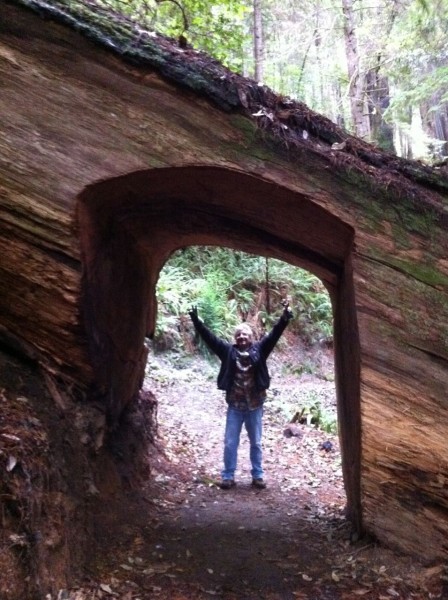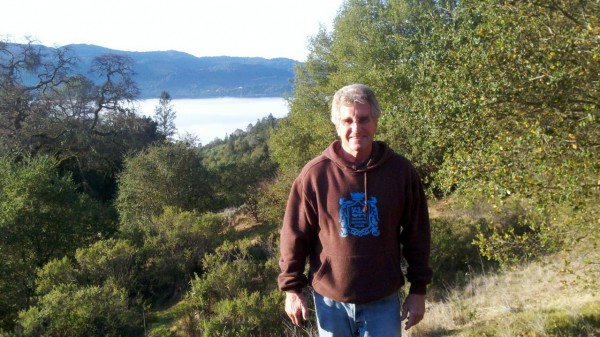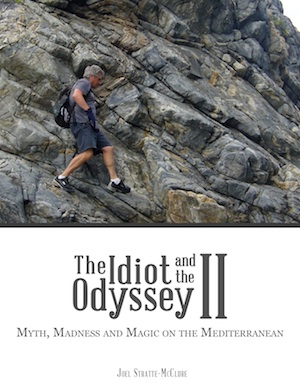A profile of The Idiot by Marc Beauchamp in the “Redding (CA) Record Searchlight” newspaper (February 4, 2012) illustrates that he continues to winter away in Northern California writing “The Idiot and the Odyssey II: Myth, Madness and Magic on the Mediterranean” @ http://www.redding.com/news/2012/feb/04/marc-beauchamp-reddings-odysseus-finds-his-way/
Marc Beauchamp: Redding’s ‘Odysseus’ finds his way home
In the publishing and movie businesses they call it a “high concept” — the idea of walking around the entire Mediterranean Sea following the adventures of Odysseus, Homer’s mythical hero.
That’s exactly what Redding native Joel Stratte-McClure has spent the last 14 years doing, trekking the Mediterranean coasts of Spain, France, Italy, Greece, Turkey and Morocco and writing about it. His first book, with the self-deprecating title “The Idiot and the Odyssey,” was published in 2008; he’s now holed up in west Redding writing volume two.
His love of Greek myths and heroes goes back to an illustrated clothbound book, “Myths and Legends of the Ages,” he read at age eight with its tales of Pandora, Circe, Phaeton, Daedalus and Icarus, Echo and Narcissus.
“I used to run to that book as soon as I got off the school bus,” he remembers. As proof, its well-thumbed pages are stained with what he says is rocky road ice cream.
Life-changing book
Another book that changed his life: Robert Fitzgerald’s classic 1962 translation of “The Odyssey,” bought for $6.95 while Stratte-McClure was in college. “That was a very small price to pay for a lifelong muse.”
Even before he began his epic trek, Stratte-McClure had gotten around — after Redding (Shasta High class of ’66), he earned degrees from Stanford and Columbia University, worked as a reporter for Time Inc. in Africa and Europe, briefly published a newspaper in Paris, and raised a family in the south of France.
In all he’s visited some 100 countries. In just the past three years he’s been to Tibet, China and the Galápagos Islands, in addition to spending at least four months a year hiking and researching in southern Europe. “It’s become my life. It’s all I do professionally,” he said of his Mediterranean odyssey. He’s racked up more than 5,200 miles so far and is less than halfway around the Mediterranean. He sees a third volume eventually, with the quest taking 20 years in all.
On his latest trip to Europe, he swam the Hellespont (aka the Dardanelles), the famous Turkish strait that divides Europe from Asia Minor. (Lord Byron described his four-mile swim, in 1810, in his scandalous satirical poem “Don Juan.”)
A born raconteur
Stratte-McClure has a raconteur’s gift for storytelling and sketching vignettes. Three from his book: stumbling into the world’s biggest nudist colony (where to put the pedometer?), inadvertently trespassing on model/singer/French first lady Carla Bruni’s Riviera estate, and nearly dying in a fall off a seaside goat path in Morocco.
Along the way he describes the characters he meets and also meditates on divorce (a “melancholy” one helped propel him on his journey), alcoholism, the value of friends, parenthood, mortality, love and sex, and life as an expat for 30-plus years.
You also get an “oblique introduction” to “The Odyssey,” which Stratte-McClure calls the “world’s first travel narrative and a sketch of all humanity” complete “with lessons, values and culture” — and plenty of romance. “The Odyssey is just full of women,” he says.
On coming home
Perhaps the biggest theme of that epic poem is homecoming — the hero’s 20-year trek back to his home and family in Ithaca after the Trojan War.
I asked Stratte-McClure, in an email, what he’d learned about himself by returning to Redding.
“The importance of my upbringing here (education, adventurous and athletic outdoor activity, family, friends) in fashioning who/what I’ve become; the enjoyment of rediscovering my roots and past friends, particularly grade school and high school classmates, forty years later; and the grateful acknowledgment of how fortunate I was to have gotten out of town.”
Speaking of family, he seems touchingly devoted to his “feisty” 92-year-old mother, Helen Stratte; they dine together at least once a week and she rang him twice during my hourlong interview.
I asked him what he noticed most about how Redding had changed during his four decades away. He began by painting a word picture of life in a small California town during the postwar boom.
“The drugstore-on-the-corner, know-the-owner-of-each-business, see-your-friends-on-Market-Street-during-the-day-and-drag-Pine/Market-at-night, to meet your pals at the Arctic Circle in the center of a downtown with a soulful feeling.”
Change, loss
That sense of community and belonging has changed, he believes.
“The I-know-most-of-the-20,000-people-population has been replaced by anonymous chain stores, no Market/Pine St. social scene and a randomly gathered population of 100,000 located in a rural-urban sprawl lacking a center and/or a soul. Fortunately the surrounding beautiful and comforting countryside has remained the same.”
Stratte-McClure’s readable book is available locally at Enjoy: The Store downtown, at All About Books on Lake Boulevard and on Amazon.com.
Good luck with volume two, Joel. It’s nice to have you home for a spell.

The Idiot takes a winter hike in the Northern California Redwoods.

The Idiot climbs Mount Saint Helena in Northern California.
Text: Marc Beauchamp, The Redding Record Searchlight (Feb. 4, 2012)
Photo: Luke Stratte-McClure & Ron Rosager.




 Follow
Follow